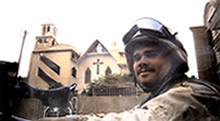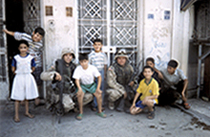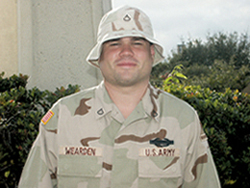|
 Frank
William "Will" Wearden Jr., an Aggie Catholic, was found murdered
Monday, May 14, 2012, near Kingsville, Texas. The Catholic
Lighthouse newspaper had written a story about Will’s deployment
to Iraq in the December 2003 issue. In honor of Will, his story is
being reprinted on the Victoria Diocese Website. A full story about
Will’s life and death will be printed in the June 2012 issue of
The Catholic Lighthouse. Will was born in Victoria, Texas, on
December 24, 1978, to Frank W. and Gloria Rosse Wearden. Frank
William "Will" Wearden Jr., an Aggie Catholic, was found murdered
Monday, May 14, 2012, near Kingsville, Texas. The Catholic
Lighthouse newspaper had written a story about Will’s deployment
to Iraq in the December 2003 issue. In honor of Will, his story is
being reprinted on the Victoria Diocese Website. A full story about
Will’s life and death will be printed in the June 2012 issue of
The Catholic Lighthouse. Will was born in Victoria, Texas, on
December 24, 1978, to Frank W. and Gloria Rosse Wearden.
Local soldier returns home on leave from
Iraq (orignal story by Cindy Brewer)
Spc. Will Wearden, 25 years old this Christmas
Eve and a native of Victoria, is stationed in Iraq. During his
recent two-week leave he visited with The Catholic Lighthouse
staff because he wanted to alert their readers to the fact that
there are Christians in Iraq, even Catholic Christians.
His parents, Frank and Gloria Wearden, said
that every time he’d call home he’d ask them to pray for the Iraqi
Christians.
The section Will patrols as a Humvee gunner is
in a Christian section of Baghdad. It also happens to be one of the
poorest sections. Will was not expecting to encounter Christians in
Iraq. “I didn’t know there would be Christians at all,” he said. Of
the local Iraqi Christians he said, “They assumed we were
Christians. It was a big deal for the children to relate to us by
saying, ‘I am Christian.’ Even if they knew very little English, at
least they knew how to say they were Christian.”
The Christian parents seem very glad the
American forces are there. The troops are often offered tea and
Cokes by the locals, he said; the children bring them holy cards and
rosaries. Will has noticed that there are about six Christian
churches in the 200-or-so block section his unit patrols. Christians
comprise three percent of the population of Iraq. The section is not
completely Christian though; Muslims and Christians both live in the
area.
Muslims at first wanted to keep their distance;
they too, saw us as Christians.“We were probably there for three
months before the local Muslim citizens’ fear wore off,” Will said.
We try to be sensitive to their religious needs. “We’re instructed
not to let our religion play a role; we’re not supposed to have much
interaction any way.”
The military tries to stay away from mosques,
unless they’re requested by the clerics to protect the area, or if
there is a serious security issue the Army must investigate. Now
that the local Iraqis realize the Americans are not there to kill,
rape, steal and then run away, both Christians and Muslims offer
drinks to the soldiers.
Where Will is stationed, electricity has been
restored and residents have running water. “About three days a month
the city streets are covered in waste,” Will said. But that’s
because the pump stations were so poorly engineered.
His unit focuses on the schools of the area –
they first had to make the places into learning centers. Now they
see to it that teachers are getting paid. I asked why the schools
were “trashed out,” as he mentioned. He said because of 10 years of
sanctions.
The school kids were so happy to get rid of the
picture of Saddam Hussein that was required to be in their book,
Will said. They’d say, “Saddam Donkey, Good Bush.”
Will’s company also takes care of complaints
from the Iraqi residents. Security concerns that can be justified
will receive some form of protection from them, he said, such as
complaints about neighbors looting or fear of neighbors and
terrorist activity. We’re very responsive to those calls. The U.S.
military has trained thousands of Iraqis to be security guards, and
these guards are dispatched to handle the complaints.
“They now approach the Americans with
complaints to get something fixed or changed. This is a sign they
really trust us.” They come to us to solve problems because they are
used to the state having a lot of control in their lives, he said.
The only sneers or negative remarks Will heard
from Iraqis were from rich people. Who knows what is behind their
motives, he said.
“Presence is what is needed for stability. The
Iraqis need to feel they’ll be taken care of, that we’re not these
awful animals.”
“They (terrorist recruiters) are going to have
a problem finding kids who will strap bombs to their backs (suicide
bombers) after having seen the soldiers and Americans,” he said. He
believes this is true even in Muslim neighborhoods.
Will joined the Army after a series of major
incidents affected his life.
The pivotal event was the bonfire mishap at
Texas A&M Nov. 1999 in which 12 persons, including his best friend
and two other friends were killed. While attending A&M he had been
very involved with the bonfire activities.
After the mishap he realized he had been waging
his whole future on the success of that fire. Everything I had set
up fell apart with one fell swoop, he said.
After failing some classes he realized he was
dealing poorly with the catastrophe. With guidance from academic
counselors he took some spring classes at Victoria College then
returned to A&M in the fall. The fall bonfire season proved to be
too early for Will to claim total healing from the previous year’s
incident. Again with the guidance of academic counselors he decided
to take a full-time construction job with thoughts about joining the
Army.
The next fall, with the September 11 terrorist
attacks, Will’s decision to join the Army was clinched.
He said he was raised in a patriotic family –
he was singing Texas Our Texas when most kids his age only sang
Barney songs. He always knew that if the Army needed more young men,
he’d join. His decision to join came on the heels of the September
11 terrorist attacks. On Jan. 5, 2002, he signed up for three years
with the U.S. Army.
Regarding joining the Army, Will said, “I
really worked it out before I signed up.”
 “I
prayed before I voted. I voted my conscience, and I pray for the
leadership of my country. I’ve done what I’m in control of; once you
do that you can settle into your job and do what you’re told.” “I
prayed before I voted. I voted my conscience, and I pray for the
leadership of my country. I’ve done what I’m in control of; once you
do that you can settle into your job and do what you’re told.”
“I answered the call of my country when it
needed me; but what I didn’t realize is that I needed the Army.”
His time in the Army has helped him to grow up
and get some of the immaturity out of his system, he said. He plans
to make a fresh start and return to Texas A & M in 2005.
(Click each picture to enlarge)
|
